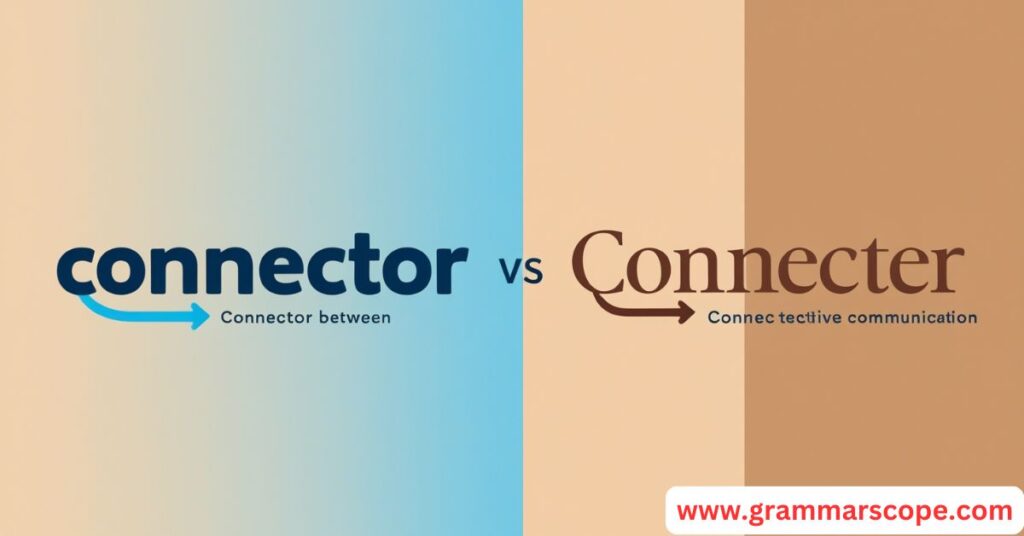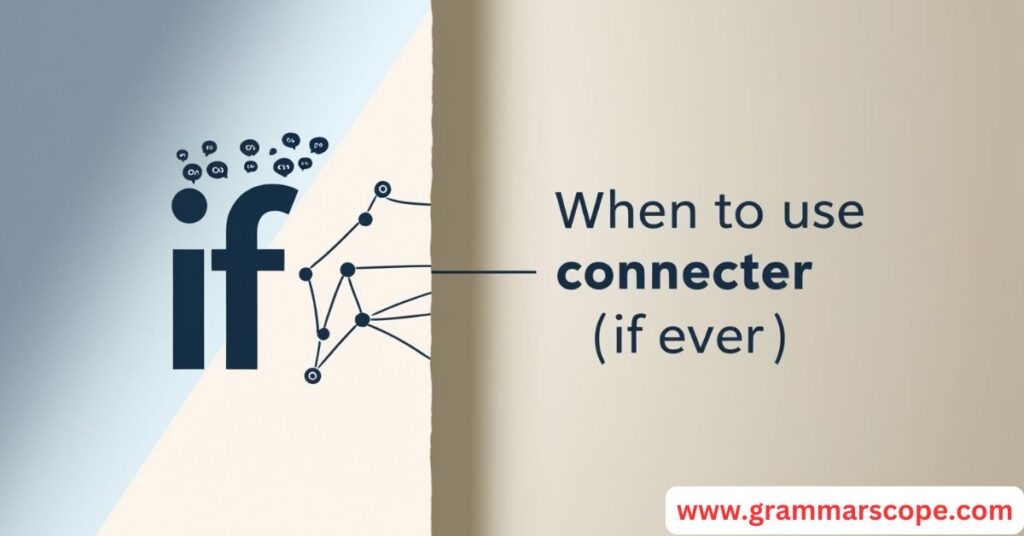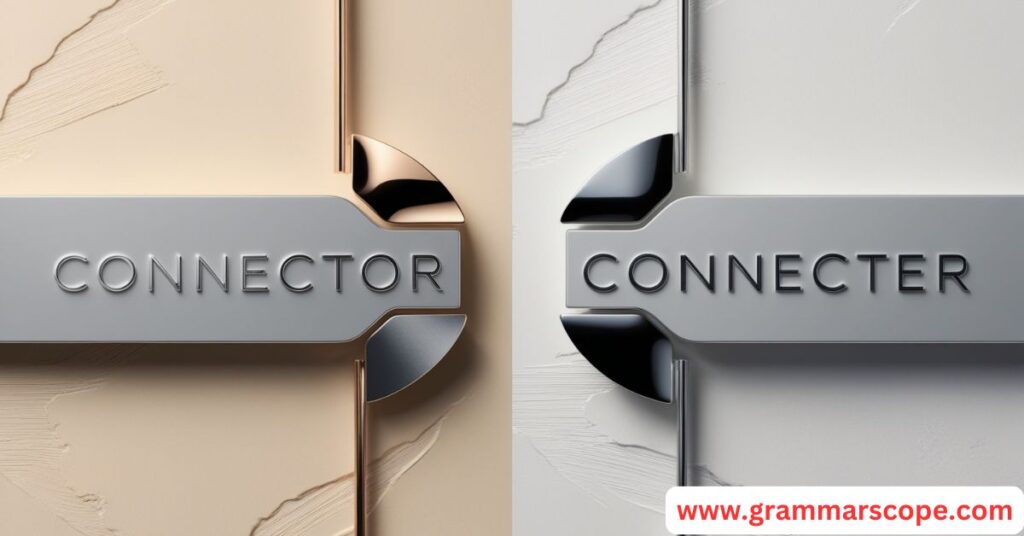The English language has its fair share of quirks, and one area where this becomes evident is in spelling variations. Take connector and connecter as an example. At first glance, these words appear nearly identical, leading many to wonder if both are correct. But only one of them holds up as the correct spelling in modern usage.
This article dives deep into the differences, offering a definitive guide to help you understand when and why connector is the proper choice. Along the way, we’ll clarify the usage differences, discuss common misconceptions, and provide practical writing examples to reinforce your understanding.
Mastering English spelling isn’t just about memorizing rules it’s about appreciating the nuances of language. Words like connector vs connecter often cause confusion due to their similar structure, but with the right knowledge, you can avoid mistakes that might undermine your writing. Whether you’re crafting professional emails, explaining grammatical rules, or discussing technological tools, this guide will empower you to use the word connector confidently.
What’s the Difference Between Connector and Connecter?

The key distinction lies in correctness and relevance. Connector is the accepted spelling in modern English, while connecter is an outdated term that has largely fallen out of use. Here’s a quick word comparison:
- Connector: The standard term used in technology, grammar, and communication.
- Connecter: A historical variation that is rarely seen today.
The dominance of connector is evident in dictionaries, style guides, and professional usage. Connecter, though once valid, has been replaced in modern contexts, making it a relic of older English. If you’re aiming for polished, contemporary writing, always use connector.
Why Does This Confusion Occur?
The spelling confusion stems from patterns within the English language. Many words ending in “-tor” (like actor, director, and inspector) follow a predictable structure, leading some to assume connecter might also be acceptable. However, language nuances dictate that connector is the sole correct option in modern English.
Additionally, regional differences and typos contribute to the problem. Non-native speakers or those less familiar with proper spelling might encounter alternative spellings online, further perpetuating the mix-up. To avoid mistakes, remember: connector is the form recognized universally today.
Common Uses of Connector in English
The word connector has versatile applications across various fields, from technology to communication. Let’s explore its primary contexts with real-world writing examples.
1. Technological Context
In technology, a connector refers to a physical device that links two components. These might include USB ports, HDMI cables, Ethernet plugs, or audio jacks. Connectors are essential for enabling functionality and communication between devices.
Example Scenario:
Imagine you’re troubleshooting a hardware issue at work. Here’s a sample email:
Subject: Faulty HDMI Connector
Hi Kevin,
I’m reaching out because the HDMI connector on the office projector seems to be damaged. It’s causing signal disruptions during presentations. Could you arrange for a replacement or repair this week?
Thanks in advance!
Best regards,
Anna
In this context, connector refers to the physical interface that ensures seamless connections between devices.
2. Grammatical Connector
In writing, a grammatical connector is a linking word that joins clauses, sentences, or ideas. Examples include conjunctions like and, but, so, and however. These linking words are crucial for maintaining the flow and coherence of your writing.
Example Sentence:
“The meeting started late, so we had to reschedule the follow-up discussion.”
3. Networking and Communication
In a social or business context, a connector is someone who brings people together. This metaphorical use emphasizes the role of connectors in fostering relationships, building networks, and creating opportunities.
Example Scenario:
At a business conference, someone might say:
“You should connect with Clara. She’s a fantastic connector in the tech industry and knows all the key players.”
This highlights the figurative meaning of connector as a relationship-builder.
When to Use Connecter (If Ever)

The short answer is: almost never. While connecter was once an accepted form, it is now considered an outdated term. Using it in modern writing—especially in formal contexts—can make your work seem unpolished or incorrect. Unless you’re referencing historical texts, stick to connector for clarity and accuracy.
Connector vs Connecter: A Quick Comparison
Here’s a side-by-side comparison to make things clear:
| Connector | Connecter |
|---|---|
| Modern and correct spelling | Outdated and rarely used |
| Commonly used in technology, grammar, and networking | Not used in contemporary contexts |
| Widely recognized in dictionaries and style guides | Largely obsolete in modern writing |
Common Mistakes to Avoid
- Using connecter in professional communication Always use connector to maintain professionalism and accuracy.
- Confusing connector with conductor A conductor refers to someone who leads (e.g., an orchestra conductor), while a connector links things together.
- Overlooking context Ensure that your use of connector fits the situation, whether it’s describing a physical object, a grammatical tool, or a metaphorical role.
What Does It Mean to Spell Connector Correctly?
Spelling connector correctly reflects your understanding of English spelling and attention to detail. In professional or academic writing, even minor errors can detract from your credibility. By mastering this proper usage, you’ll ensure your communication remains clear and polished.
Pro Tip:
When writing about connector vs connecter, remember that connector is the trusted choice in modern English. Its use in various fields, from grammar to technology, makes it the universal standard.
Example Email to Reinforce Proper Usage
Subject: Order for Network Connectors
Hi Lisa,
I hope you’re doing well! I noticed that the network connectors we’ve been using for the new servers are running low. Could you place an order for a fresh batch by the end of the week? These connectors are essential for linking the systems efficiently. Let me know if you need more details.
Thanks for handling this!
Best,
James
Additional Context: Why Accuracy Matters
Using the correct form of a word like connector is more than a matter of grammar—it’s about ensuring your audience understands your message without distraction. Whether you’re drafting a professional document or explaining technical concepts, precision in language conveys competence and credibility.
Frequently Asked Question
What is the meaning of connecter?
The word “connecter” is an alternative, less common, and mostly outdated spelling of “connector.” It refers to something or someone that connects or links two or more things together, whether physically, metaphorically, or conceptually.
In modern English, “connector” is the preferred and widely accepted spelling, while “connecter” is rarely used and considered obsolete in most contexts.
What is a connecter word?
A connecter word (more commonly spelled connector word) is a term used to describe words or phrases that link ideas, sentences, or clauses together in written or spoken language. These words help establish relationships between ideas, improve the flow of communication, and make the text easier to understand. They are often referred to as linking words, transition words, or conjunctions.
Examples of Connecter/Connector Words:
- Addition: and, also, moreover, furthermore, besides
- Contrast: but, however, yet, on the other hand, although
- Cause and Effect: because, since, therefore, thus, consequently
- Sequence: then, next, after, finally, first, second
- Comparison: similarly, likewise, in the same way
- Conclusion: in conclusion, to sum up, in summary
Example Sentence:
“I was running late for work, so I decided to skip breakfast.”
Here, “so” acts as a connecter word, linking the cause (running late) to the effect (skipping breakfast).
Connecter/connector words are essential for clear communication and cohesive writing.
What do you mean by connector?
A connector is something that links or joins two or more things together, whether physically, like a cable connector, or conceptually, like words or phrases that connect ideas in writing or speech.
What is the plural form of connector?
The plural form of connector is connectors.
Is it connector or connecter?
The correct spelling is connector. Connecter is an outdated and rarely used alternative spelling that is considered incorrect in modern English. Always use connector for both formal and informal contexts.
Conclusion: The Right Choice Is Connector
When faced with the choice of connector or connecter, the answer is clear: always go with connector. It’s the standard spelling in modern English, accepted in both formal contexts and informal contexts. Whether you’re describing physical devices, linking words, or metaphorical connections, the term connector ensures clarity and professionalism.
By understanding the usage differences and recognizing spelling confusion, you can confidently avoid mistakes and elevate the quality of your writing. With this guide in hand, you’re now equipped to use connector effectively in any scenario.

Emma Olivia is an experienced blogger and the creative mind behind Grammar Scope. With a passion for language and years of writing expertise, she crafts engaging, informative content that simplifies grammar and writing tips for readers worldwide. Emma’s dedication to clear communication and love for the written word shine through every article she publishes, making Grammar Scope a trusted resource for language enthusiasts and learners alike.






